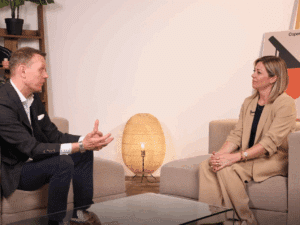What is fractional HR?
Whilst it has been around for a few years now, fractional working is now increasingly in demand. None more so than in the established SME, start-up and scale-up markets where businesses don’t necessarily require resource on a full-time basis or perceive they have the budget for hiring experienced expertise. For the fractional executive, this enables them to work with multiple clients in a way that is beneficial for both the individual and the businesses they serve.
So, with this in mind, Dominique Seal, who specialises in executive interim HR and transformation, sat down with Barry Flack, an award-winning Fractional HR Executive.
In this interview, Dominique spoke to Barry to help clarify what fractional HR is, why he thinks it has emerged, how best to engage with it and the value it provides both executives and clients.
For more information on fractional working, either from a business or a consultant perspective, please get in touch with Dominique today.
What is fractional HR working?
A fractional HR person is someone with broad and deep expertise to support companies (typically SME in size) that need help with that function on a part-time, interim capacity. Robust enough to credibly interact with the founders/CEO and with a toolkit and network that can quickly create value as the business grows and evolves.
That means my clients get on-demand access to my HR expertise without having to hire a full-time Head of People that they likely can’t afford (and frankly might not even need full-time, at this stage).
When someone thinks of an HR freelancer, they often think of someone who may not be fully engaged with an organization. That’s not the case. A fractional HR Executive acts as a readily available, flexible and seamless part of a leadership team on an ongoing basis, a driving force to the success of your business and promptly available for employees on-demand. Their value is that they can use that experience and expertise to allow the business to quickly go through the gears from a growth and complexity perspective.
What fractional HR is not
- The typical full-time resource that the business feels the need to own under the old social contract construct. The liquid workforce is driving a horse and coaches through this old paradigm and thinking.
- The one-off external change agent that delivers the bespoke workshop, an associated bucket list of actions to follow-up with, but leaves the room before sustainable change happens. Embedded into the organisation, the fractional HR Executive delivers ongoing and contextual culture change like ‘adding milk to coffee’ by constantly and positively flipping the system.
- The outsourcing HR services business who will deliver transactionally against the symptoms of dysfunction (the grievance and disciplinary letters, risk mitigation and provide a minimalist suite of services), not a unique and consciously positive culture build that gets in front of the potential issue, before it emerges.
Why is it emerging?
- The push can be attributed to the elevation of HR post-pandemic in the face of unpredictable external market forces and an emerging new world of work. It’s a time for new thinking and capabilities, bringing the best of the outside, to helps SMEs do that effectively beyond the old cookie cutter HR template of yesteryear.
- As a pull, the unbundling of work and the 4-day week lobby are manifestations that productivity and value is increasingly not determined by a deal struck a century ago for a 40-hour working week in return for a fixed salary. Why wouldn’t we approach the business problem in a more focused manner, based more on outcomes rather than paying for time served?
- The liquid workforce, growing increasingly in size, importance, and specificity, has now spawned another category that opens up new and agile resourcing solutions that leaves the traditional and time-consuming advertise > hire > onboard a perm process in its wake for speed, expertise and productivity gain.
What are the unique selling points of fractional HR?
- The client gets the best of both worlds
Ultimately the clients get the output they need for a “fraction” of what it would cost to hire a full-time executive with the same level of expertise.
- Cost effectiveness
Regular full-time staff are expensive, especially if not used to full capacity. Fractional HR, as it implies, is a fraction of the cost too. A quick example shows a full-time HR leader including base salary, bonus and benefits, additional Employers’ National Insurance contributions, can easily exceed £200,000 per year. The fractional model typically is 40% of that expense.
- Flexibility
Increase or decrease HR services (or even days) to match the evolving needs of the business. Many smaller businesses do not need full-time support on a regular basis. That support may ebb and flow, but fractional HR allows you that flexibility.
- Accounting treatment advantage
Consultants can be accrued differently than regular full-time employees and as a result are not recorded as a fixed overhead.
- Ease of severability
If the business arrangement ends there are no added expenses typically incurred with full time employees such as severance, unemployment liability etc. Just serve the agreed notice, when necessary, as circumstances change.
What are the unique selling points for the fractional HR Leader themselves?
Personally, I get to work with around a handful of clients at any given time. I walk the line between strategic and tactical support, simultaneously building people capabilities, while handling the day-to-day people issues that inevitably pop up. You need to be a builder at heart and I personally love being able to translate practices learned at bigger institutions famed for execution excellence, into something that works for the unique culture of each SME, whilst walking the fine line with being ‘too corporate’.
Related content
About Barry Flack
Barry Flack is an award-winning Global HR Executive, with 30 years of experience, successfully helping organisations adapt to the changing world of work.
He spent his early career working in a variety of large, complex organisations, undergoing big transformation programmes, before moving into the interim space and operating in roles as diverse as Chief People Officer, Learning & Development, Employee Relations, Head of Talent Acquisition and Programme Lead on HR Technology deployments.
Since 2016, as a portfolio professional, Barry’s primary focus has been on supporting SME businesses on an embedded, fractional HR basis or via niche consultancies. Projects range from supporting Founders scaling to hyper-growth, challenger brands in a new talent market and reimagining organisations to meet new realities.
A passionate advocate of HR Tech throughout his career, he advises Start-Ups, helping them understand how their product can be successful in their respective digital workplace markets.
Barry has been recognised consistently by his peers as a leading influencer in the HR space, speaks at conferences across the globe, and writes for a variety of industry publications.
I hope that was a useful introduction, but if a follow-up conversation would be helpful to you, please drop me a message via me@barryflack.co.uk.




